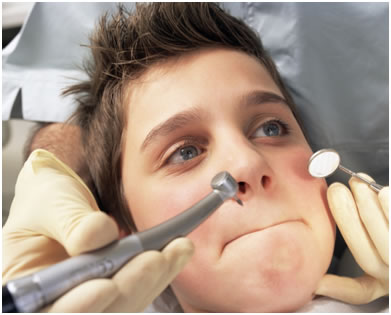Dental Treatment under General Anesthesia
1. What is general anesthesia?
General anesthesia is a controlled state of unconsciousness that eliminates awareness, movement and discomfort during dental treatment. General anesthesia renders your child completely asleep. A physician with specialized training (anesthesiologist) can use various medications to provide general anesthesia for patients receiving dental care.
2. Who should receive general anesthesia for dental treatment?
Dental treatment under general anesthesia may be indicated for children or adolescents with extensive dental needs who are extremely uncooperative, fearful or anxious or for the very young who do not understand how to cope in a cooperative fashion. General anesthesia also can be helpful for children requiring significant surgical procedures or patients having special health care needs., Dental treatment performed under general anesthesia is beneficial and efficient.

3. Is general anesthesia safe?
Although there is some risk associated with general anesthesia, it can be used safely and effectively when administered by an appropriately-trained individual in an appropriately-equipped facility. Precautions are taken to protect your child during general anesthesia; personnel who are trained to manage complications will monitor your child closely. Your pediatric dentist will discuss the benefits and risks of general anesthesia and why it is recommended for your child.
4. What special considerations are associated with the general anesthesia appointment?
A physical evaluation is required prior to general anesthesia for dental care. This physical assessment provides information to ensure the safety of your child during the general anesthesia procedure. Your pediatric dentist or anesthesiologist will advise you about evaluation appointments that are required.
Parents are instructed to report to the pediatric dentist any illness that occurs prior to the general anesthesia appointment. It may be necessary to reschedule the appointment. It is very important to follow instructions regarding fasting from fluids and foods prior to the appointment. Your child will be discharged when stable, alert, and ready to depart. Patients often are tired following general anesthesia. You will be instructed to let the child rest at home with minimal activity until the next day. Post-operative dietary recommendations also will be given.
Prior to your appointment:
- Please notify us of any change in your child’s health. Do not bring your child for treatment with a fever, ear infection or cold. Should your child become ill, contact us to see if it is necessary to postpone the appointment.
- You must tell the doctor of any drugs that your child is currently taking and any drug reactions and/or change in medical history.
- Please dress your child in loose fitting, comfortable clothing.
- Your child should not have milk or solid food after midnight prior to the scheduled procedure and clear liquids only (water, apple juice for up to 6 hours prior to the appointment.
- The child’s parent or legal guardian must remain at the hospital or surgical site waiting room during the complete procedure.
After the appointment:
- Your child will be drowsy and will need to be monitored very closely. Keep your child away from areas of potential harm.
- If your child wants to sleep, place them on their side with their chin up. Wake your child every hour and encourage them to have something to drink in order to prevent dehydration. At first it is best to give your child sips of clear liquids to prevent nausea. The first meal should be light and easily digestible.
- If your child vomits, help them bend over and turn their head to the side to insure that they do not inhale the vomit.
Sources
http://www.aapd.org/publications/brochures/anesthesia.asp





